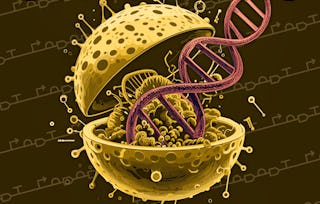This course gives an introduction to how to create genetic circuit models. These models leverage chemical reactions represented using the Systems Biology Markup Language (SBML). The second module introduces methods to simulate these models using ordinary differential equation (ODE) methods. The third module teach stochastic simulation methods. The fourth module introduces several variations of the stochastic simulation algorithm. Finally, the fifth module introduces genetic technology method that leverage computational analysis for selecting parts and verifying their performance.

Engineering Genetic Circuits: Modeling and Analysis
Seize the savings! Get 40% off 3 months of Coursera Plus and full access to thousands of courses.

Engineering Genetic Circuits: Modeling and Analysis
This course is part of Engineering Genetic Circuits Specialization


Instructors: Chris Myers
Included with
Recommended experience
What you'll learn
Design and analyze models of genetic circuits.
Simulate genetic circuit models using ODE simulation methods.
Simulate genetic circuit models using stochastic simulation methods.
Utilize genetic technology mappers to select parts for genetic designs.
Skills you'll gain
Tools you'll learn
Details to know

Add to your LinkedIn profile
16 assignments
See how employees at top companies are mastering in-demand skills

Build your subject-matter expertise
- Learn new concepts from industry experts
- Gain a foundational understanding of a subject or tool
- Develop job-relevant skills with hands-on projects
- Earn a shareable career certificate

There are 5 modules in this course
Earn a career certificate
Add this credential to your LinkedIn profile, resume, or CV. Share it on social media and in your performance review.
Build toward a degree
This course is part of the following degree program(s) offered by University of Colorado Boulder. If you are admitted and enroll, your completed coursework may count toward your degree learning and your progress can transfer with you.¹
Instructors


Offered by
Explore more from Electrical Engineering
 Status: Free Trial
Status: Free TrialUniversity of Colorado Boulder
 Status: Free Trial
Status: Free TrialUniversity of Colorado Boulder
 Status: Free Trial
Status: Free TrialUniversity of Colorado Boulder
 Status: Free Trial
Status: Free TrialUniversity of Colorado Boulder
Why people choose Coursera for their career

Felipe M.

Jennifer J.

Larry W.

Chaitanya A.

Open new doors with Coursera Plus
Unlimited access to 10,000+ world-class courses, hands-on projects, and job-ready certificate programs - all included in your subscription
Advance your career with an online degree
Earn a degree from world-class universities - 100% online
Join over 3,400 global companies that choose Coursera for Business
Upskill your employees to excel in the digital economy

